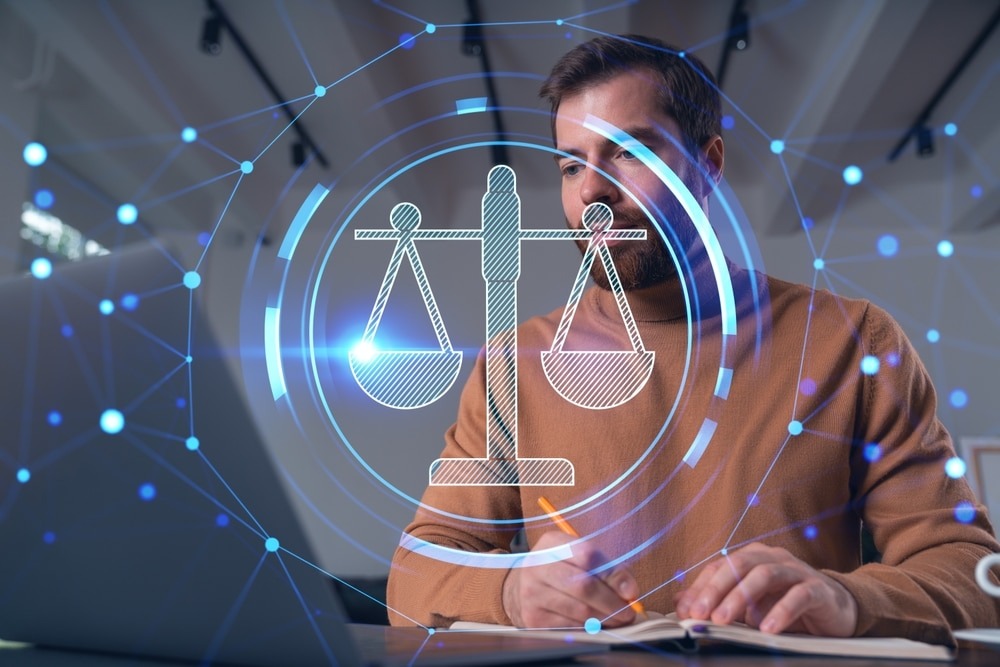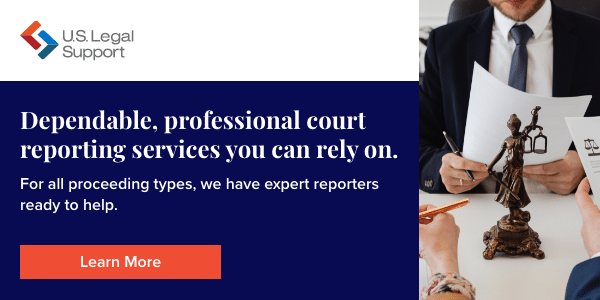AI-Powered Court Reporting: Shaping the Legal Landscape

Artificial Intelligence (AI) is the genie let out of the proverbial bottle, moving at a technological speed that makes it difficult to keep up with emerging developments. For court reporting, AI can decrease costs, reduce turnaround time, and help provide coverage for proceedings.
As a partnered tool—rather than a replacement to human oversight —AI powered court reporting has amazing potential for the legal industry.
How Is AI Relevant to Court Reporting?
Discussion of Artificial Intelligence is everywhere today, being showcased as either the start of a brave new world or the end times. At its basic level, Artificial Intelligence is the creation of computer systems intended to simulate human intelligence, including1:
- Speech and translation aided by NLP (natural language processing) and DLP (deep learning processing)
- Pattern recognition and predictive learning
- Interacting with its environment, including image and audio recognition
- Critical thinking, reasoning, and decision-making
Speech functionality occurs through automatic speech recognition (ASR), a complex process that can be summarized as2:
- Acoustic capture, analysis, and phoneme (speech unit) breakdown
- Language modeling via speech pattern recognition and phoneme conversion
- Punctuation and capitalization based on NLP
Another hot term is “machine learning,” which is a facet of AI that refers to its ability to observe, interact, and grow—or learn—with minimal human interference.
Advantages of AI in Court Reporting
AI is entering court reporting as a scalable model for use across firms and court systems. The top two subsets of AI specifically relevant to augmenting court reporting tasks include the use of ASR for:
- Transcribing speech to text with growing accuracy
- Translation between languages globally
The benefits of using AI within legal proceedings, include faster turnaround time, scale, and accuracy.
Looking Forward
AI isn’t an all-or-nothing question. The use of artificial intelligence in law offers important benefits—with the emphasis on the “use of” rather than a “switch to” AI. There is a clear need to rely on the skills and functions of experienced, professional, court reporters to oversee and certify official transcripts alongside their other critical functions.
Court reporters are best suited to provide:
- Presence as an official of the court to administer oaths and related functions
- Certification of the truth, security, and chain of evidence of recordings and transcripts
- Live presence to request immediate clarification and provide a readback
- Nuanced interpretation of tone, inflection, and gestures
- Continuous monitoring of equipment and software for unbroken records
AI in court reporting offers:
- Raw speech-to-text AI transcription to generate immediate drafts at a high volume
- Clean connection between transcript text and its origin via paired audio recordings
- Speaker identification aided by premium microphones and the ability to isolate tracks
- Continuing development in accurately recording accented, foreign, and low speech
- The potential for aid through specialized practice knowledge dictionaries
U.S. Legal Support: Leading the Future in Court Reporting
U.S. Legal Support began in 1996, and for nearly 30 years, we’ve provided the service, skills, security, and leading technology critical to litigation support services. Our Client Portal protects your data in accordance with the NIST Cybersecurity Framework and is SOC 2 Type 2 and HIPAA compliant.
We provide full-service litigation support services, including multi-methodology court reporting, legal transcription, interpreting and translation services, record retrieval and analysis, litigation and trial consulting, and more.
If you’re ready to learn more and connect with our nationwide network of 5,000+ professionals, contact us today by phone, email, or website request form.
Sources:
- McKinsey. What Is AI? https://www.mckinsey.com/featured-insights/mckinsey-explainers/what-is-ai
- NVIDIA. Essential Guide to Automatic Speech Recognition Technology. https://developer.nvidia.com/blog/essential-guide-to-automatic-speech-recognition-technology/
- Forbes. Decoding The Future Of Legal Transcription: AI Versus Human. https://www.forbes.com/sites/forbesbusinesscouncil/2023/07/21/decoding-the-future-of-legal-transcription-ai-versus-human/?sh=7807d63c1be1
- National Court Reporters Association. Representative Cases of Electronic and Digital Recording Failures in the U.S. Court System: Evidence Supporting the Use of Certified Shorthand Reporters to Provide the Record. https://www.thejcr.com/wp-content/uploads/2023/02/Failure-Doc-Edited_February_11_2023.pdf
- Attorney At Work. Three Ways AI-Assisted Court Reporting Helps Improve Client Experience. https://www.attorneyatwork.com/three-ways-ai-assisted-court-reporting-helps-improve-client-experience/
- Australasian Lawyer. The technology that’s transforming court reporting. https://www.thelawyermag.com/au/news/general/the-technology-thats-transforming-court-reporting/441199
- National Court Reporters Association. Registered Skilled Reporter (RSR). https://www.ncra.org/certification/NCRA-Certifications/registered-skilled-reporter-(rsr)

Editoral Policy
Content published on the U.S. Legal Support blog is reviewed by professionals in the legal and litigation support services field to help ensure accurate information. The information provided in this blog is for informational purposes only and should not be construed as legal advice for attorneys or clients.


